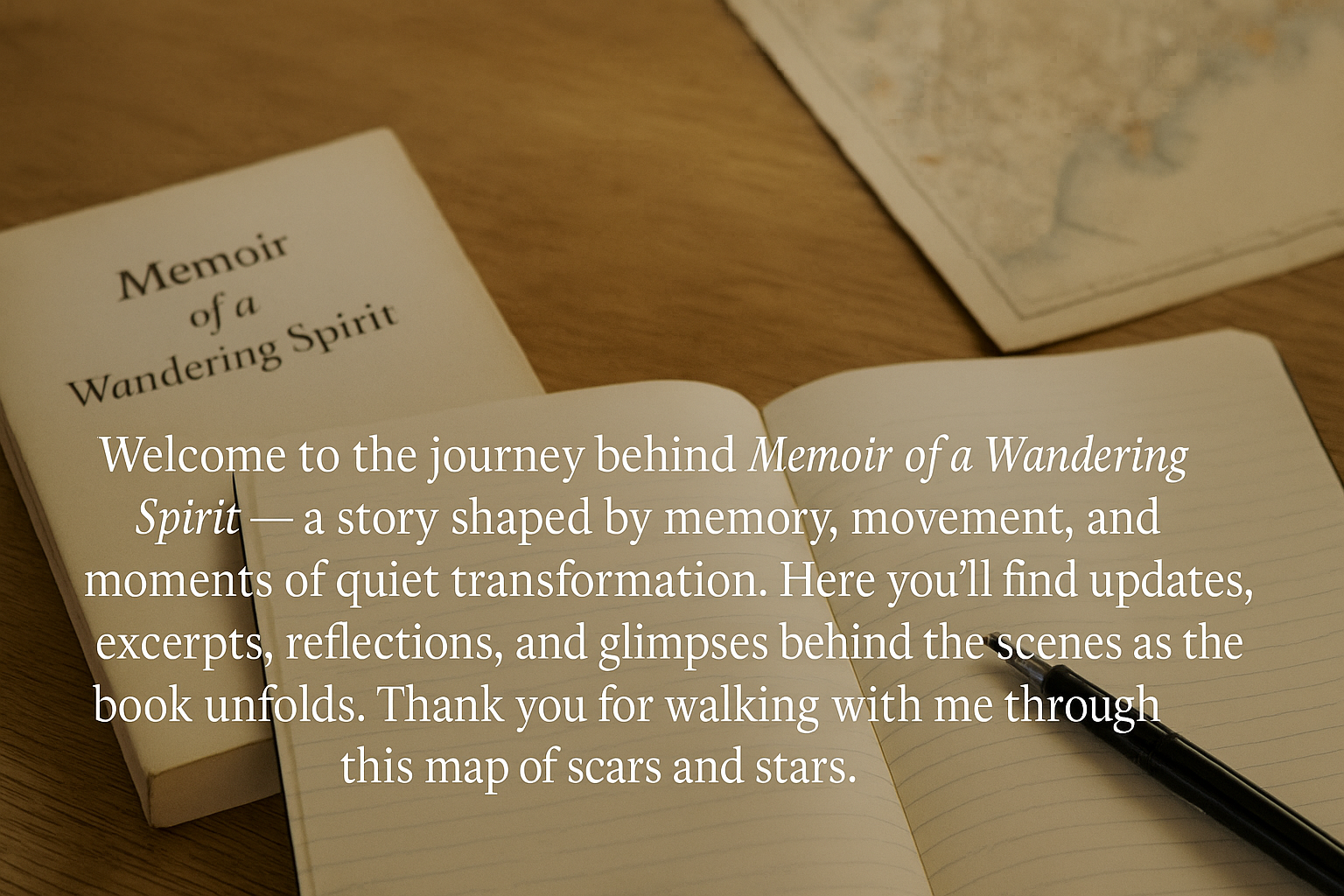Chapter 15 Finished — Where the Nile Divides
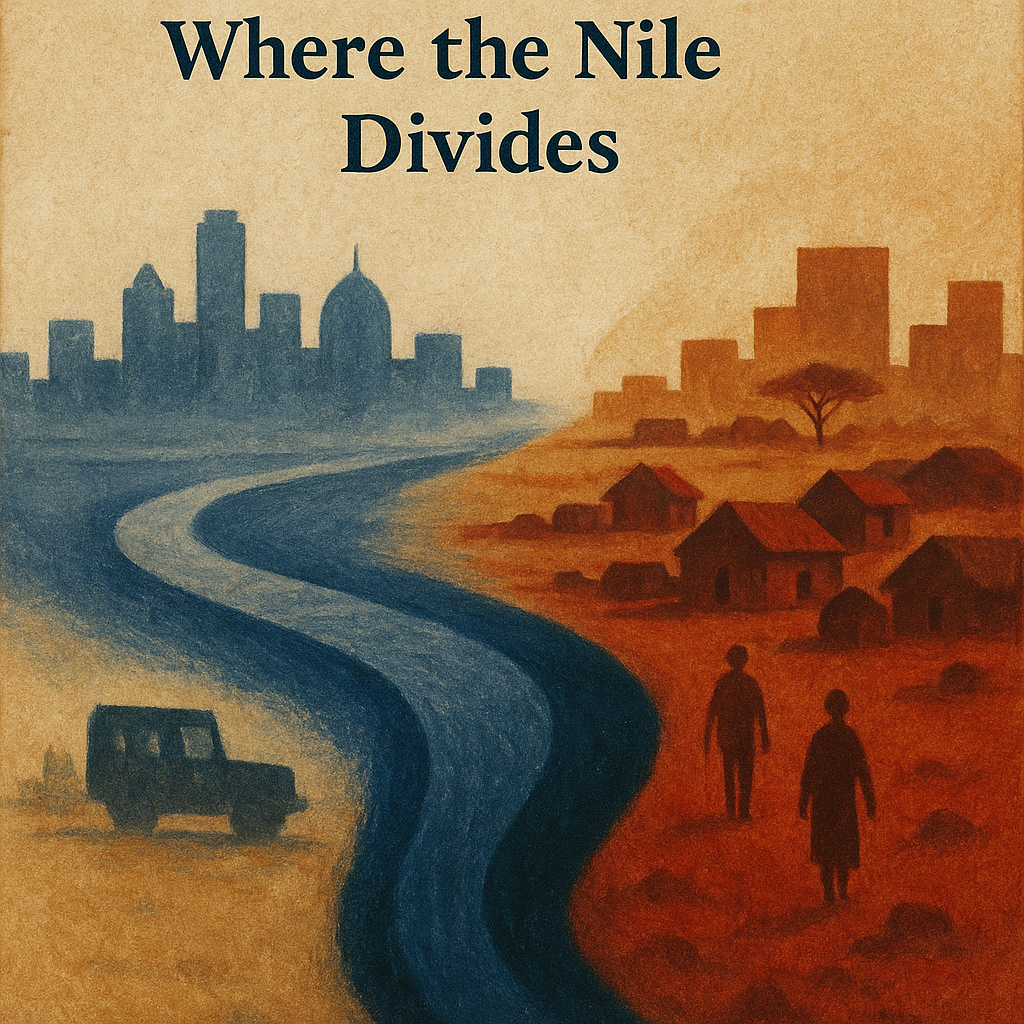
Chapter 15 Finished — Where the Nile Divides
Chapter 15 of Memoir of a Wandering Spirit is now complete. This one felt wide and weighty — a bridge between the intensity of Afghanistan and the long stretch of years that Kacper would spend in Sudan.
The chapter begins with return: quiet holidays in Poland, where life slows to the rhythm of coffee in his mother’s kitchen, winter walks in Biegonice, and gossip with neighbours who still see him as the boy who once disappeared into hospitals and far-off countries. But soon, the pace quickens again.
In New York City, at the headquarters of GNI, Kacper finds himself in the fluorescent hum of logistics — budgets, procurement, contingency planning. The Hudson shimmers beyond glass windows as staff prepare for what comes next. It is here, in a map-lined meeting room, that he learns his next destination: Sudan. A deployment planned for three years, though no one pretends to know what “three years” will mean in a country at war.
From there, Paris becomes once again the threshold. At Rue Niepce, the air smells of coffee, paper, and the accumulated dust of countless departures. Briefings are thick with dossiers, maps pierced by coloured pins marking fragile humanitarian footprints. Sudan is no single dot on a map, but a scatter across vast, uneven terrain — Khartoum, Wau, Bentiu, Rubkona, and beyond. Paris prepares him with its cafés and quiet lessons, but the weight of what is coming is clear.
Then, Khartoum.
When Kacper steps from the plane, the air strikes him like a wall — dry, close, dazzling with heat. The light is too sharp for winter, too brilliant to soften. Beyond the runway, the Nile curves through the city, broad and unhurried, carrying centuries of struggle and survival.
The city unfolds in layers: whitewashed ministries, wide boulevards lined with acacias, roadside tea stalls shaded by scraps of cloth. Traffic is a coexistence of battered taxis, overcrowded buses, and donkey carts weaving stubbornly into modern flow. Soldiers linger near government buildings, watching. It is a place where history and present tense collide in every glance.
At last, the compound — a villa in Al Amarat with high walls, green grass improbably kept alive by careful watering, a patch of order in the midst of dust. Offices and residence under one roof, colleagues above and below, lives lived between files, meetings, and midnight conversations about a war that seemed endless.
From Khartoum, the story carries him further south — to Wau, a town marked by hardship and resilience. Here, the reality of humanitarian work comes into sharp relief: days spent in the TFC among children wasted by hunger, their fragile breaths a reminder of the war’s silent toll; coordination with local staff at the hospital, ensuring supplies of therapeutic milk never ran out. The town was a fragile hub, always one rumour away from violence.
Fear was never far. The Janjaweed — known here as the Murahaleen — sometimes swept through, their presence announced by sudden panic, by stories of raids and burnt-out villages. At times, bombs fell in the distance, dull thuds that turned the air heavy, reminding everyone of how precarious safety really was. Evenings on the rooftop of the guesthouse, Kacper and the nurses would sip tea and listen for the echoes, wondering if the next explosion would be closer.
Where the Nile Divides is about arrivals — not only into a new country, but into a new role, a heavier responsibility. It marks the start of Kacper’s Sudan years, a time that will stretch him in ways Afghanistan only hinted at.
“Beyond the runway, the Nile curved through the city, broad and unhurried, carrying with it the weight of a war that refused to end.”
With this chapter complete, the memoir now turns to Chapter 16 — a closer look at life in Wau, and the crossings, borders, and burdens that came with it.
Photo Album Related to this Chapter.
Chapter 14 Complete — The Weight of Silence
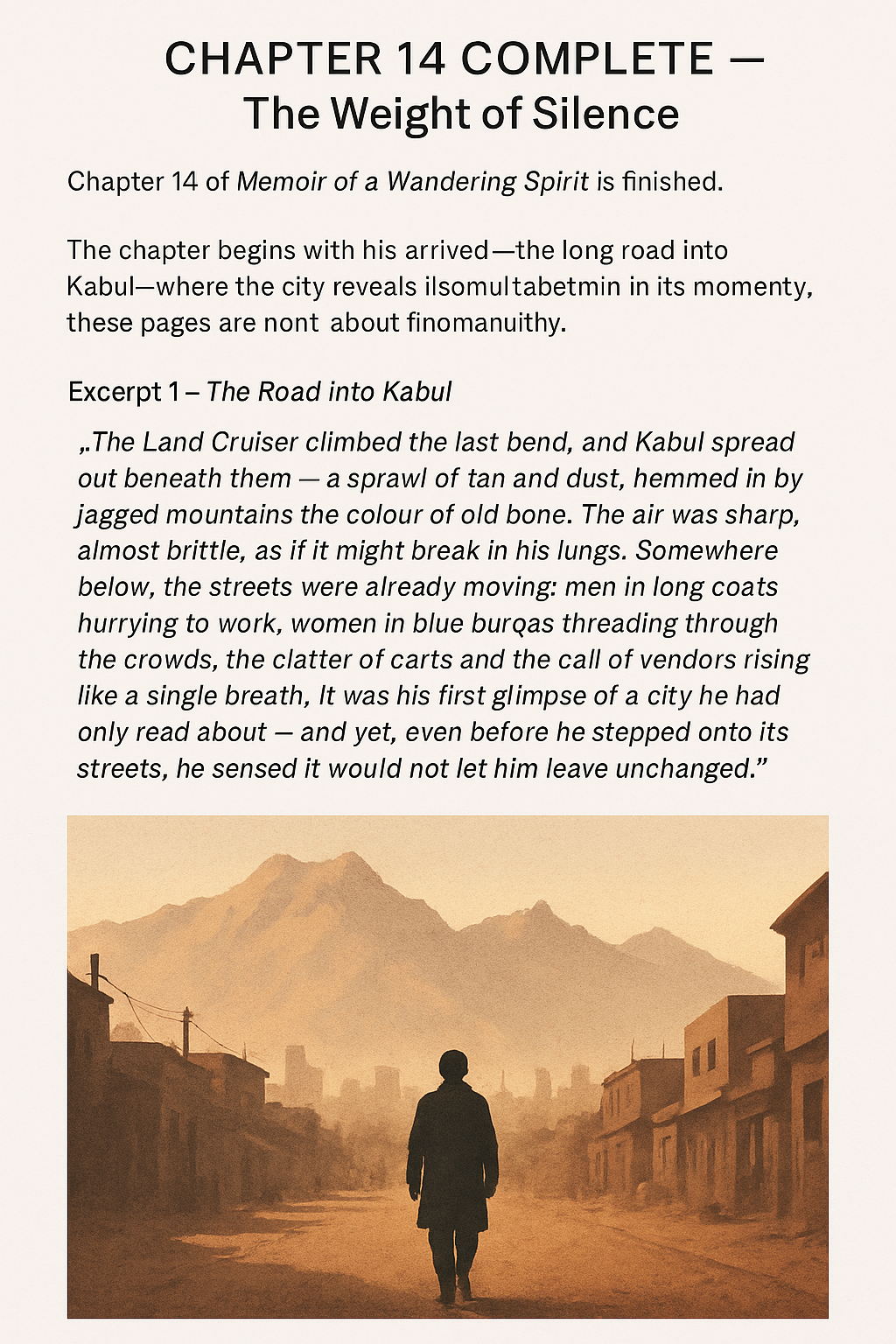
Chapter 14 of Memoir of a Wandering Spirit is finished.
It takes Kacper deep into his Afghanistan experience — a place and a moment in his life that would etch themselves permanently into his memory. These pages are not just about conflict, but about the fragile humanity that persists in its shadow.
The chapter begins with his arrival — the long road into Kabul — where the city reveals itself for the first time, held between mountains and history, dust and expectation. From there, Kacper steps into the heart of humanitarian work: crowded wards, bustling streets, and moments that defy easy understanding.
Excerpt 1 — The Road into Kabul
The Land Cruiser climbed the last bend, and Kabul spread out beneath them — a sprawl of tan and dust, hemmed in by jagged mountains the colour of old bone. The air was sharp, almost brittle, as if it might break in his lungs. Somewhere below, the streets were already moving: men in long coats hurrying to work, women in blue burqas threading through the crowds, the clatter of carts and the call of vendors rising like a single breath. It was his first glimpse of a city he had only read about — and yet, even before he stepped onto its streets, he sensed it would not let him leave unchanged.
Kacper learns the rhythms of life in the humanitarian compounds, the careful coordination behind each intervention, and the weight of small victories — a child gaining weight, a hospital ward stabilising after a long week. He walks the streets in the early mornings, when Kabul is at its most tender.
Excerpt 2 — The Children in the Ward
In the nutrition ward of the Indira Gandhi Hospital, beds stood so close that Kacper could reach from one to another without moving his feet. The air was heavy with the scent of disinfectant, sweat, and the faint sweetness of milk powder. Babies lay bundled in blankets, their ribs sharp against his palms when he lifted them. Mothers sat cross-legged at their sides, eyes hollow from too many sleepless nights. And yet, every so often, a smile would break across a face — a small, defiant act that said, not today. Those moments felt like sunlight in a windowless room.
Excerpt 3 — The Streets at Dawn
Before the city woke fully, Kacper liked to walk the narrow streets near his guesthouse. There were no car horns yet, only the scrape of a broom on stone and the soft hum of someone boiling tea behind a shuttered window. From a nearby mosque, the call to prayer unfurled into the pale sky. For a few precious minutes, Kabul belonged not to politics, or war, or hunger — but to the people who lived quietly between the headlines.
But Kabul was also a place where silence carried weight. A visit to Ghazi Stadium would stay with him for the rest of his life — not because of what he saw, but because of what it revealed about cruelty, kindness, and the shadows they cast.
Excerpt 4 — Ghazi Stadium
From far away, the sound of the crowd swelled, breaking and reforming in waves. He thought of the women — not as the condemned, not as names on a charge sheet, but as daughters, sisters, mothers. He wondered about their last sight of the sky. Afghanistan had taught him many things, but that day it taught him this: cruelty can wear the face of your neighbour, and kindness can live in the same heart that has seen too much to know the difference. And perhaps the hardest truth of all — that some things you carry away from a place are not its mountains.
Perhaps the deepest lesson came from his Afghan colleagues — especially Jawed — who reminded him that being present in a country like Afghanistan required more than skills or good intentions.
Excerpt 5 — The Lesson from Jawed
One evening, Jawed leaned back in his chair and said, “You must understand — this place has had too many teachers who came to teach, but never to learn.” His words landed quietly, without accusation, but with weight. Kacper realised he had been speaking more than listening, explaining more than asking. That night, as the oil lamp flickered between them, he promised himself that in Afghanistan, he would first be a student.
Chapter 14 is a journey into a city and a country under immense strain — but also into the resilience of those who call it home. Now, with this chapter closed, Kacper’s path will carry him into the next stages of his work, where each step forward is shaped by what Afghanistan has taught him.
Picture gallery associated to this chapter.
Chapter 13 Completed – Chapter 14 Begins
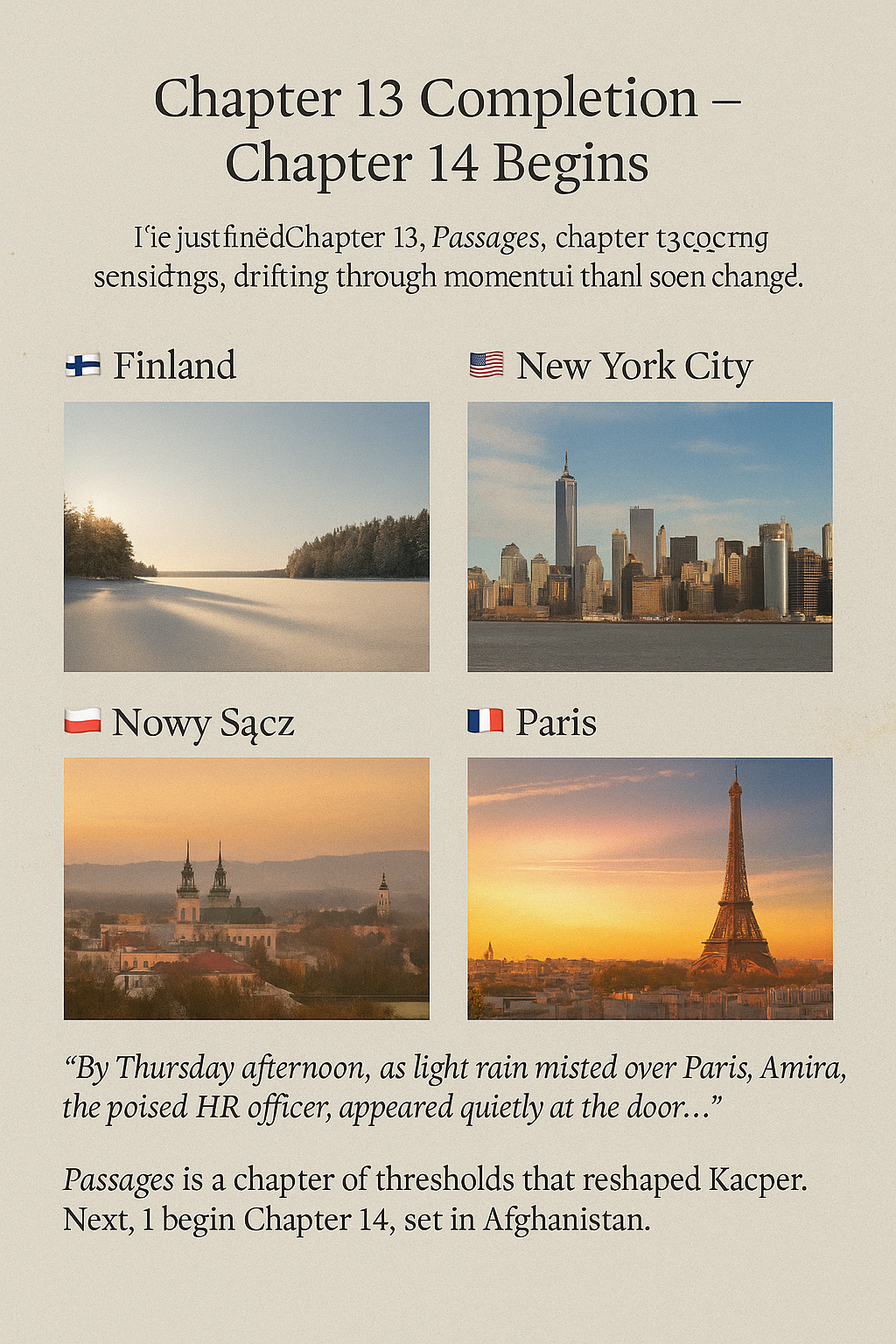
I’ve just finished Chapter 13: Passages, a chapter where Kacper crosses oceans and seasons, drifting through moments of stillness and momentum that will soon change everything.
It begins in Finland, where winter swallows the horizon in white silence. Kacper steps out of Helsinki airport into air so sharp it feels crystalline. Snow muffles the city’s sounds; Senate Square gleams like a frozen crown. In Lahti, Leena greets him with warmth and tea, their conversations echoing dreams born in Angola and Denmark. A train ride east carries him through endless forests bent under snow, past golden lights in lone farmhouses, until he reaches Kesälahti. There, a tiny school welcomes him with laughter and curiosity. He walks frozen lakes, runs barefoot from the sauna into starlit snow, and finds in Finland a vast stillness that lets him listen to himself again.
From Finland, the journey takes a bold leap to New York City. The Atlantic crossing feels like stepping into myth. Manhattan’s skyline shimmers like fallen constellations as the plane descends. A kind couple welcomes him, handing over the keys to their apartment overlooking Central Park. Suddenly, a boy from Biegonice lives alone in Manhattan. He roams Fifth Avenue, samples hot dogs and pretzels, and feels the city’s pulse under spring sunlight. He meets strangers who remind him that the world is wider than skyscrapers, stands at Battery Park watching ferries glide toward the Statue of Liberty, and imagines one day walking the halls of the UN. Meals are simple, but each bite tastes of arrival, of possibility cracking open under New York’s chaotic sky.
After a week, Kacper returns to Nowy Sącz. Winter is thawing, mountains breathe faint mist, and the house in Biegonice feels both comforting and small. He teaches English to earn a living, crosses into Slovakia on weekends, and keeps writing letters to NGOs scattered across continents. Then comes the email that shifts everything: an offer to work in Afghanistan with a humanitarian organisation. Training first in Paris. The news thrills his mother and frightens her, but beneath her fears lies pride.
And so comes Paris — not as a postcard dream, but as a gateway into a new life.
Kacper arrives with little more than a suitcase and a folder of instructions, stepping into a city that feels alive with purpose. The headquarters of the humanitarian organisation occupies a modest building, its rooms buzzing with quiet intensity. Maps of conflict zones line the walls, corridors echo with hurried footsteps, and meeting rooms hum with a dozen languages.
Training is relentless but exhilarating. From dawn till late evening, Kacper and other recruits are immersed in the realities of crisis response — how aid reaches besieged towns, how convoys thread through war zones, how negotiations open fragile corridors of safety. He learns about logistics, emergency health interventions, food security, and the silent strength of coordination that keeps field teams alive. Security briefings describe kidnappings and evacuations with unnerving calm. He begins to grasp the weight of responsibility that comes with entering a place where survival is not guaranteed.
But Paris is more than classrooms and briefings. The city itself becomes part of his initiation. At dawn, he walks along the Seine where mist rises from the water like breath from the city’s lungs. After long days of training, he wanders through Montmartre’s crooked alleys, discovering tiny bistros where jazz floats through the doorways. He loses himself in the Musée d’Orsay, stares at Van Gogh’s fevered skies, and feels both overwhelmed and emboldened.
Evenings often end in a café — bitter coffee in Saint-Germain, fresh baguettes eaten on benches near Notre-Dame. He watches Parisians rush past with scarves trailing, listens to animated debates about politics and poetry, and feels the city slowly seep into him. For the first time, he imagines a life lived entirely beyond the borders of Poland, shaped by international work and a sense of global belonging.
Paris changes him quietly. It teaches him more than procedures — it gives him rhythm, language, a sense of scale. It shows him that helping others means not only courage but humility and collaboration. The city itself feels like a threshold, preparing him for a path that began in a hospital ward years ago and now stands ready to carry him into conflict zones.
“By Thursday afternoon, as light rain misted over Paris, Amira, the poised HR officer, appeared quietly at the door.
‘Your visas for Pakistan and Afghanistan have been approved,’ she said with a reassuring smile. ‘You’ll leave this Sunday — first to Islamabad, then to Kabul.’
The words settled like both a weight and a liberation. It was no longer whispered possibility beneath Parisian skies. It was real.”
Passages is a chapter of thresholds — from frozen lakes in Finland to New York’s restless skyline, from family warmth in Nowy Sącz to Parisian boulevards glowing at dusk. Each place leaves a trace, each passage reshaping the boy who once lay in Polish hospitals into a man ready to step into one of the world’s most fragile frontiers.
With this chapter closed, I now begin Chapter 14, where Kacper steps into Afghanistan — a place where fear and purpose will meet under a sky filled with dust, mountains, and war.
Photos from Finland
Photos from NYC
Where the Red Earth Speaks: Chapter 12 is Finished!
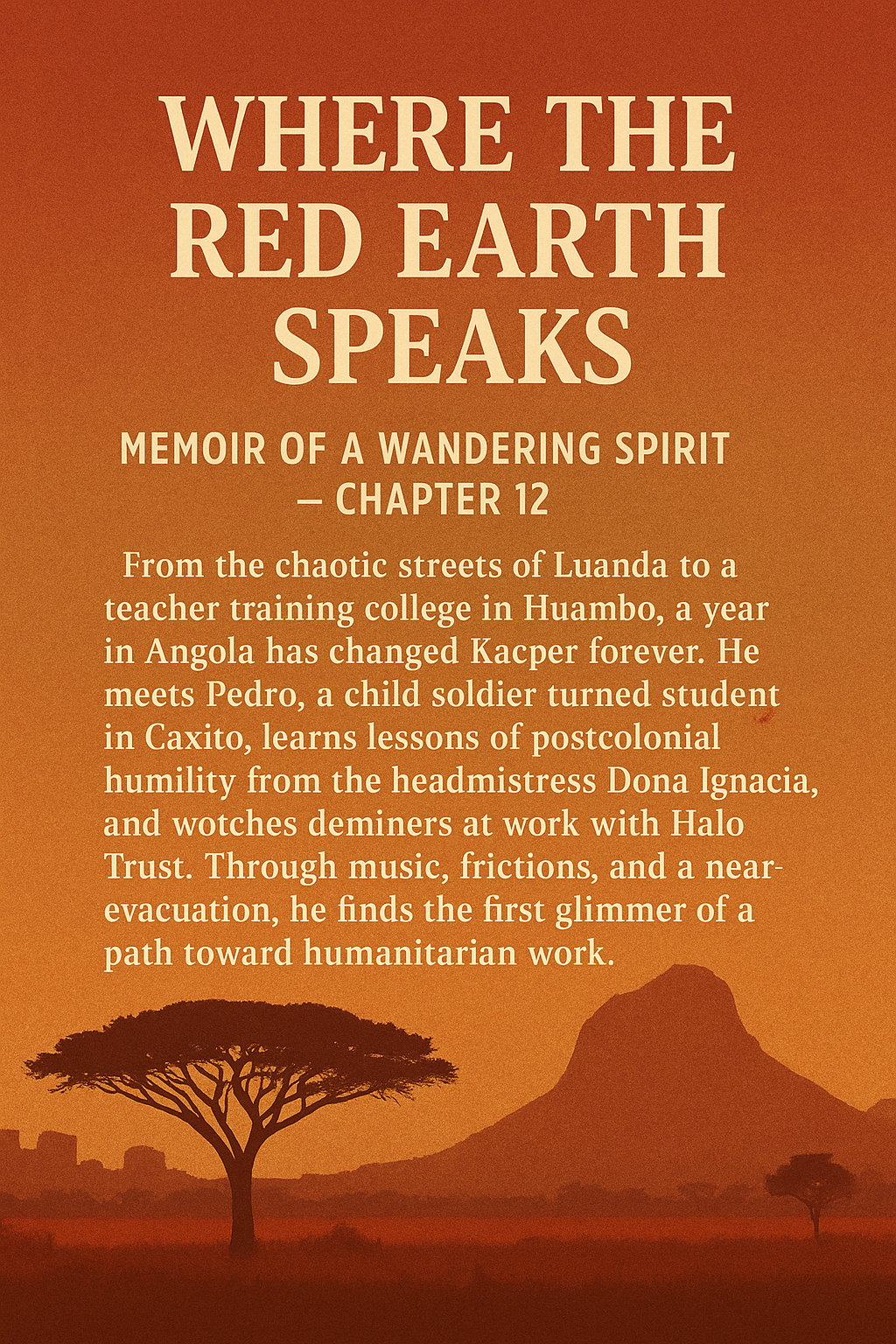
Finally, Chapter 12 is ready. This part of the memoir takes Kacper from the chaotic arrival in Luanda to the red earth of Angola’s central highlands, where a year in Huambo would change him forever.
Luanda greeted him not with war but with heat, dust, and contradictions — beaches and music on Ilha do Cabo, yet streets outside the city centre scarred by poverty and conflict. A visit to ADPP’s sorting centre revealed, in Kacper’s words:
“It was powerful because it was ordinary — ordinary for Luanda, but so utterly extraordinary to me. What seemed like destitution was daily life for the people around me. My own struggles suddenly felt privileged in ways I had never seen before.”
In Caxito, Kacper met Pedro, a trainee teacher who had once been a child soldier for UNITA. Sitting under a mango tree, Pedro spoke haltingly of forced marches, of violence no child should know, and of his fragile dream to become a teacher:
“I hurt people,” Pedro said quietly, eyes on the red dust. “But it was not who I was… I had no choice.”
Years later, Kacper would learn Pedro never fulfilled that dream — killed in an ambush shortly after graduation. The memory of that conversation would stay with him for life.
Arriving in Huambo, the war’s presence was unmistakable: bullet-riddled buildings, mined fields, and nights punctured by distant gunfire. Yet in Quissala, the teacher training college beneath Pedra da Quissala, there was music, theatre, and moments of pure defiance against despair.
“On those nights, the war fell away… the scars of Huambo faded into clapping hands and joyous cries… even teachers swayed shyly in the glow of a place where, for a few hours, life refused to bow to fear.”
There were frictions with the headmistress Dona Ignacia, lessons in humility about post-colonial wounds, and a haunting visit with Halo Trust’s deminers:
“I knew I would never forget it — the courage of Ana and Maria, the grim humour of John, and the knowledge that some of those mines, silent and waiting, bore the name of my own homeland.”
An evacuation scare brought the reality of war closer, yet solidarity among teachers and students held strong. As the rainy season returned and his departure neared, a quiet conviction formed:
“For the first time, I had glimpsed what it truly meant — walking beside people carrying scars of war, trying in clumsy ways to ease a fraction of their burden… this was no passing experience abroad. It was a first, fragile step onto a path that had begun long ago… and now, in the red earth of Angola, had found its direction.”
Weeks later, waiting for his flight home at Moscow’s Sheremetyevo airport, he knew:
“He was going home — yet nothing in him was the same.”
Chapter 12 of Memoir of a Wandering Spirit is now complete — a journey through war and resilience, music and silence, and the first steps toward a life dedicated to humanitarian work.
Link to the album featuring the time in Huambo.

